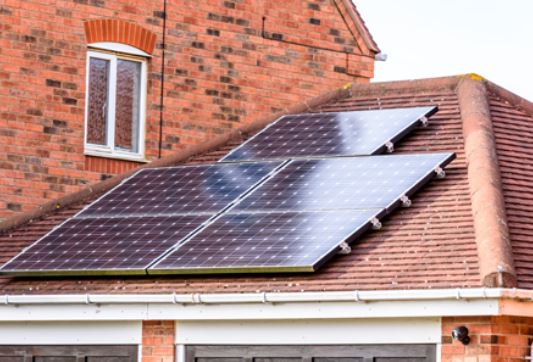Microgeneration is the generation of electricity from renewable technologies by domestic or small business properties.
Microgeneration
What is Microgeneration ?
Microgeneration can be defined as the generation of electricity from renewable technologies by domestic or small business properties. This may include solar photovoltaic (PV), micro-wind, micro-power and micro-renewable combined heat and power (CHP). The power generated from these sources can be exported to the national grid and a payment or Clean Export Guarantee (CEG) will be made available to the renewable generator.
The phased introduction of supports under the Microgeneration Support Scheme took place during 2022, with the commencement of the MSS domestic Solar PV grant on 16th February 2022, followed by the non-domestic Solar PV grant in September 2022. The non-domestic grant was significantly enhanced in July 2023 to support a wider range of businesses and non-domestic applicants.

Microgeneration Support Scheme (MSS)
The Microgeneration Support Scheme (MSS) allow for domestic applicants to apply to the Sustainable Energy Authority of Ireland (SEAI) for a grant that will go towards the installation of renewable energy technologies. The following are some of the scheme’s key features:
The key features of the scheme are:
- Domestic applicants can apply to the Sustainable Energy Authority of Ireland (SEAI) for a grant towards the cost of installing Solar PV equipment. In 2023, capital grants are available up to a maximum of €2,400
- For domestic applicants, homes built pre-2021 are eligible
- For domestic applicants, buildings do not have to meet a minimum BER (Building Energy Rating) standard
- The initial non-domestic scheme enabled applicants such as businesses, farms, schools, and community buildings to apply for a grant for installations up to 6kW, at the same grant amounts as domestic customers, that is, up to a maximum of €2,400.
- An extended funding range from €2,700 to €162,600 was introduced in July 2023 to support non-domestic installation sizes between 7 kWp and 1,000 kWp (1 MW) capacity, on a pilot basis to the end of 2023.
- These expanded support measures for non-domestic applicants negate the need to develop and implement the Clean Export Premium (CEP) feed-in tariff; which was the measure originally envisaged for providing support for installations between 6.1 kW and 50kW. This will be kept under review in consultation with the Commission for Regulation of Utilities (CRU).
- The SEAI will assess extending the grant supports to other eligible technologies, including micro-wind, micro-hydro and micro-renewable CHP.
- Supports under the MSS will gradually reduce over time from 2024, to take account of reducing system costs
How Do I apply?
You can apply for a solar PV grant via the SEAI here. Once the Applicant has received Grant approval, they will have 8 months to complete the works and submit the declaration of works. It’s extremely important these timelines are adhered to ensure your grant payment. After 8 months the grant will expire and will be declined.
How am I connected to the national grid ?
All applicants will need an export grid connection in order to be able to access the Clean
Export Guarantee payment or Clean Export Premium feed-in tariff. Evidence of grid
connection details (technology type, technology capacity, MEC, etc.) will need to be provided to the Supplier.
ESB Networks must be informed of the intention to install micro-generation, e.g. through a
Micro-generation Installation Notification Form (NC6) for system sizes up to 6kW single
phase and 11kW for 3 phase, or through a Mini-Generation Installation Notification Form
(NC7) for system sizes between 6kW and 17kW for single phase and 11kW and 50kW for 3
phase.
What is a Commercial Export Guarantee ?
An individual engaged in microgeneration for domestic use may generate surplus electricity. They may choose to export this excess electricity to the national electricity grid. In doing so, they are eligible to receive remuneration in the form of the Commercial Export Guarantee (CEG). Payment is determined on the number of kWh generated. The price paid will be a competitive market rate from the individual’s electrical supplier. The CEG will be available to new and existing micro-generators. The Commission for Regulation of Utilities (CRU) will establish the eligibility criteria.
To avail of the CEG, you must firstly have a suitable grid connection. You can organize an export grid connection either through the ESB or the renewable energy operator you are dealing with.
For further information relating to ESB microgeneration, please see here.

